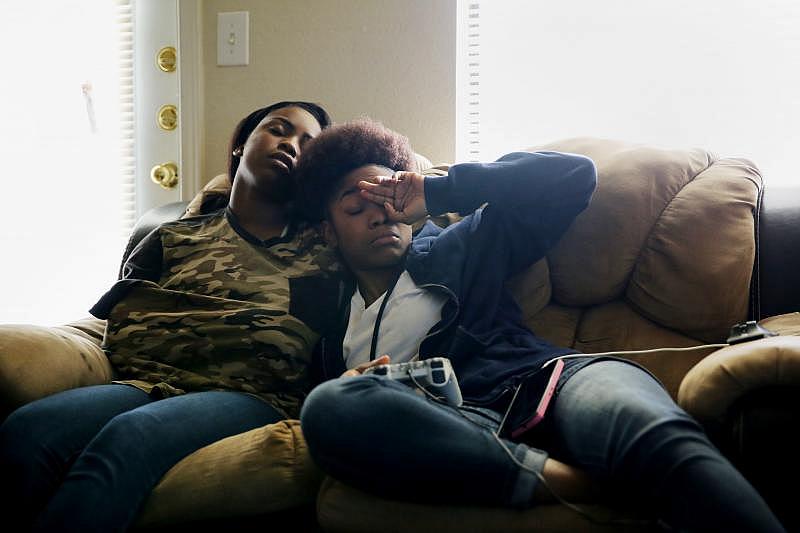Carve your own persistent path when reporting on a problem that has no policy to address it

Tom Fox/Dallas Morning News
Ed. Note: 2016 National Fellow Cary Aspinwall is sharing insights on how she reported "Overlooked" at the 2018 Data Fellowship this week. We're reposting her behind-the-scenes essay on the series here to mark the occasion. Also, read more about her reporting process here.
A source mentioned something in passing that I couldn’t get out of my mind: Children were disappearing from school suddenly, and their teachers suspected it was because mom was in jail.
Having reported extensively on the criminal justice system in Oklahoma, I could understand instantly how this was happening: Women sat in jail because they couldn’t afford bail, criminal cases got delayed for months due to a backlogged court system, and arrests often happen when a mom is away from her kids.
But the biggest challenge I had in reporting my project “Overlooked” was proving to readers that this was happening. And then doing it in Texas, where I moved in the middle of my fellowship. This was no small feat, considering Texas has the largest criminal justice system in the United States. And it keeps very little public data regarding women in the criminal justice system and their children.
Challenge assumptions
Andy Jacobsohn/The Dallas Morning News
When I say it was a challenge to prove to other people that this was happening, that included my own editors. I joined the investigative team at The Dallas Morning News mid-fellowship and specifically asked if I could continue my project there.
“If you can find proof that it’s happening here, sure,” my editor said. Challenge accepted. Nearly everywhere I went and everyone I talked to about this issue would say: “But surely the child welfare system checks on them....”
And then I had to explain how child welfare workers are sometimes called to the scene of an arrest, especially if a child’s safety is in question. Otherwise, what happens to the child is entirely dependent on who arrests the mother and where the child is when she’s arrested.
A question I was frequently asked during my reporting: Why women? Men go to jail, too -- and in larger total numbers. But most of them are not the primary caregivers for their children. Women are, and they’re going to jail at staggeringly increasing rates. Because the local jail population fluctuates greatly, it’s harder to study and there is far less data about pre-trial incarceration in the U.S.
Searching for data
At first, nearly every idea we had to obtain data and real-life examples for my reporting was a total bust. Child welfare case records aren’t public in Oklahoma or Texas. We tried to seek de-identified data from the state, but soon learned that the child welfare system in Texas doesn’t differentiate in records when it sends workers to the scene of an arrest because a child has been abused, or if a worker is sent simply because a mother has been arrested on a non-abuse charge. Even the state didn’t know if it was checking on children every time a mother was arrested.
We also explored the idea of pairing school truancy data against jail databases. It was complicated, time consuming, and we struck out.
So I combed through the laws for the state of Texas, looked at best practices for police departments suggested by a national policy group, and surveyed local law enforcement agencies. I learned most aren’t required to call child welfare workers to the scene of an arrest unless they believe a child is abused or neglected. Most of the time, they try to do their best, they told me. But very few had actual policies on the books.
I also had a set of public records that I knew I could work with, but it wouldn’t be easy: The actual arrest reports of women jailed in Dallas County. We were able to scrape several thousand of these from the county court system’s website, and use optical character recognition tools to search them looking for keywords.
What surprised me the most: Unless they were the victim or a direct witness to a violent crime, children were rarely mentioned.
But there were other clues in the records: Women pulled over in traffic stops, suspected of shoplifting the bag containing baby clothes. The arrest report said nothing about a baby.
There were strollers with no children in them. Car seats. Kids on playgrounds.
Sometimes, the reports mentioned leaving a kid with a family member or caregiver. They never said whether the person had been vetted by anyone.
Carve your own path
The social workers and defense attorneys who first spoke to me about this asked one thing: Please don’t write about women in this situation before their criminal case is settled. You’ll only make things worse for them, they said.
After reviewing thousands of pages of court records, I understood that if I wrote a story about a woman sitting in jail while her kids were home alone, that almost certainly would result in her receiving an additional charge of child neglect. We strive to tread lightly as reporters, and this would have the opposite effect of what I wanted.
So I made an ethical choice to write about women whose cases had already been adjudicated -- they were convicted, and either serving prison time or had recently completed a sentence.
Their arrests would be recent enough that they could remember details we could try to verify with records.
But how could we get all those details missing from the arrest reports? We asked the women themselves. We obtained permission from the Texas Department of Criminal Justice to send a survey to women in their custody asking them what happened to their children when they were arrested. We also insisted they allow us to include a postage pre-paid, pre-labeled envelope so that the women wouldn’t bear the expense of postage for answering our survey. We got an amazing response rate.
We also found a data set no one was really looking at in Texas: Monthly population reports from county jails to the Texas Commission on Jail Standards. We discovered something staggering, that hadn’t been reported: A 44 percent increase in the pre-trial female jail population in Texas, from 2011 to 2016.
Tap into your obsession (or outrage)
Andy Jacobsohn/The Dallas Morning News
When others might have abandoned this project out of frustration, the reason I was able to keep pushing forward is this is a topic I’m deeply passionate about. When I arrived at The Dallas Morning News, we were in the middle of a radical newsroom makeover where reporters were encouraged to find obsessions -- not just beats. The idea behind obsessions is that it leads you to write about people, not institutions.
Well, my obsession came with me when I moved to Texas. I recently had the privilege of listening to New Yorker writer/author Katherine Boo speak to an audience of journalists at the Mayborn Literary Nonfiction conference, where she encouraged us all to tap into our outrage.
My outrage? We live in a country where 12-year-old Kylia Booker was left to fend for herself and care for her younger sisters because her mom was jailed for being late to court. The criminal justice system had ample opportunities to check on those children and chose to ignore them.
And while we know more women are sitting in local jails across the U.S., no one knows how many children are out there surviving just like Kylia and her sisters did.

